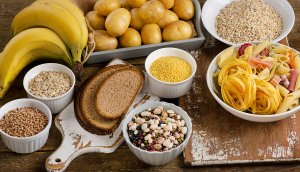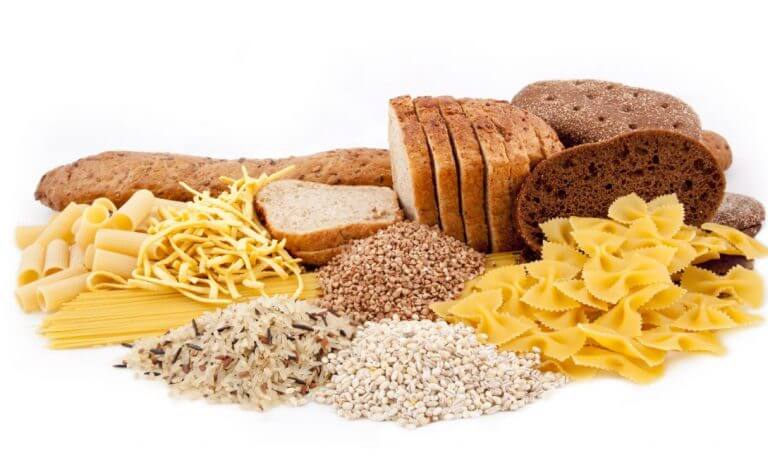Do You Need Carbs to Gain Muscle?

When it comes to gaining muscle, there are three fundamental factors that intervene. In the first place, there’s our genetic predisposition to muscle gain. In the second place, we can find the type of training that we practice, and the last factor is our diet. What place do carbs have, and are they really important to gain muscle?
Even though modern studies show that other factors such as gut flora can have an important link to gaining muscle, the truth is that the most important factors are the ones we mentioned above. Learn more about this subject in the following paragraphs.
Protein: an essential nutrient
The macronutrient that determines muscle gain par excellence is protein. It’s in charge of building tissue, and therefore it’s compensation after exercise.
It’s clear that protein is a limiting factor when it comes to generating mass. Our protein intake shouldn’t be below 0.8 g per lb of bodyweight [1].
However, muscle gain can only happen when we follow a hypercaloric diet. If we look at the laws of thermodynamics, to build tissue, we need energy. Therefore, we need to provide the body with more energy than we expend.
This way, with the right protein intake, we’ll experience an increase in body fat if we don’t work out, and muscle gains if we do.
What’s the role of carbs to gain muscle?
Carbs aren’t an essential nutrient to build muscle mass. However, they can play an important role when it comes to limiting the intensity of your training.
Carbs are one of the first energetic pathways of anaerobic metabolism. Hence, they’re a necessary element to carry out a proper strength training session. While carbs won’t help to build tissue, they’ll help to perform at the required intensity to produce compensation.
On top of that, they’re also a good strategy to add calories to your diet and reach a super caloric balance. However, not all types of carbs are optimal.

The best thing you can do is choose complex carbs with a low glycemic index that are rich in fiber. This way, you’ll stimulate the selective growth of bacterial colonies that contribute to improving your digestion and overall health.
Since these types of carbs also produce a gradual increase of insulin, they help to reduce pancreatic stress and the probability of suffering from complex illnesses further down the road.
Carbs to gain muscle according to the time of day
Consuming simple sugars is only a good idea during the moments prior to strength training or during exercise. You must always do it in moderate amounts, to prevent possible reactive hypoglycemia that decreases your performance.
In these moments, a small intake of sugary foods will increase your blood glucose levels and allow you to intensify your workout. Drinking sugary beverages during the workout session will also contribute to your performance.
Once you finish your training, carbs with a low glycemic index should be your priority again. This way, rice, potatoes, quinoa, oats and whole wheat pasta become allies for those who intend to gain muscle with a strength training program.
Glycogen replenishment
Carbs are also an essential nutrient when it comes to replenishing the empty glycogen reservoirs [2]. After a strength training or anaerobic session, it’s very likely that the glycogen in your muscles is at very low levels. In these situations, it’s important to consume carbs to prevent injuries during later workouts.
These carbs don’t have a direct link with muscle gain either, but it’s an indirect relationship. Lower risk of injuries translates into a greater capacity to train at high intensity and less stand by time. Therefore, the more muscle stimuli, the greater the hypertrophy will be.

Conclusion
Carbs don’t intervene directly in the process of building lean muscle, but they do it indirectly. They’re closely related to your performance under anaerobic conditions, and they’re an essential nutrient for the recovery process after strength training.
However, it’s fundamental to select the right type of carbs depending on the time of the day and the goal we’re trying to achieve. It’s usually a good idea to choose carbs with a low glycemic index and foods that are rich in fiber.
When it comes to gaining muscle, there are three fundamental factors that intervene. In the first place, there’s our genetic predisposition to muscle gain. In the second place, we can find the type of training that we practice, and the last factor is our diet. What place do carbs have, and are they really important to gain muscle?
Even though modern studies show that other factors such as gut flora can have an important link to gaining muscle, the truth is that the most important factors are the ones we mentioned above. Learn more about this subject in the following paragraphs.
Protein: an essential nutrient
The macronutrient that determines muscle gain par excellence is protein. It’s in charge of building tissue, and therefore it’s compensation after exercise.
It’s clear that protein is a limiting factor when it comes to generating mass. Our protein intake shouldn’t be below 0.8 g per lb of bodyweight [1].
However, muscle gain can only happen when we follow a hypercaloric diet. If we look at the laws of thermodynamics, to build tissue, we need energy. Therefore, we need to provide the body with more energy than we expend.
This way, with the right protein intake, we’ll experience an increase in body fat if we don’t work out, and muscle gains if we do.
What’s the role of carbs to gain muscle?
Carbs aren’t an essential nutrient to build muscle mass. However, they can play an important role when it comes to limiting the intensity of your training.
Carbs are one of the first energetic pathways of anaerobic metabolism. Hence, they’re a necessary element to carry out a proper strength training session. While carbs won’t help to build tissue, they’ll help to perform at the required intensity to produce compensation.
On top of that, they’re also a good strategy to add calories to your diet and reach a super caloric balance. However, not all types of carbs are optimal.

The best thing you can do is choose complex carbs with a low glycemic index that are rich in fiber. This way, you’ll stimulate the selective growth of bacterial colonies that contribute to improving your digestion and overall health.
Since these types of carbs also produce a gradual increase of insulin, they help to reduce pancreatic stress and the probability of suffering from complex illnesses further down the road.
Carbs to gain muscle according to the time of day
Consuming simple sugars is only a good idea during the moments prior to strength training or during exercise. You must always do it in moderate amounts, to prevent possible reactive hypoglycemia that decreases your performance.
In these moments, a small intake of sugary foods will increase your blood glucose levels and allow you to intensify your workout. Drinking sugary beverages during the workout session will also contribute to your performance.
Once you finish your training, carbs with a low glycemic index should be your priority again. This way, rice, potatoes, quinoa, oats and whole wheat pasta become allies for those who intend to gain muscle with a strength training program.
Glycogen replenishment
Carbs are also an essential nutrient when it comes to replenishing the empty glycogen reservoirs [2]. After a strength training or anaerobic session, it’s very likely that the glycogen in your muscles is at very low levels. In these situations, it’s important to consume carbs to prevent injuries during later workouts.
These carbs don’t have a direct link with muscle gain either, but it’s an indirect relationship. Lower risk of injuries translates into a greater capacity to train at high intensity and less stand by time. Therefore, the more muscle stimuli, the greater the hypertrophy will be.

Conclusion
Carbs don’t intervene directly in the process of building lean muscle, but they do it indirectly. They’re closely related to your performance under anaerobic conditions, and they’re an essential nutrient for the recovery process after strength training.
However, it’s fundamental to select the right type of carbs depending on the time of the day and the goal we’re trying to achieve. It’s usually a good idea to choose carbs with a low glycemic index and foods that are rich in fiber.
All cited sources were thoroughly reviewed by our team to ensure their quality, reliability, currency, and validity. The bibliography of this article was considered reliable and of academic or scientific accuracy.
- Tipton KD., Phillips SM., Dietary protein for muscle hypertrophy. Nestre Nutr Inst Worskshop Ser, 2013. 76: 73-84.
- Roach PJ., Depaoli-Roach AA., Hurley TD., Tagliabracci VS., Glycogen and its metabolism: some new developments and old themes. Biochem J, 2012. 441 (3): 763-87.
This text is provided for informational purposes only and does not replace consultation with a professional. If in doubt, consult your specialist.








